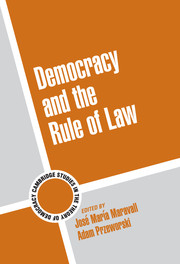Book contents
- Frontmatter
- Contents
- List of Contributors
- Acknowledgments
- Introduction
- Part I
- 1 Lineages of the Rule of Law
- 2 Power, Rules, and Compliance
- 3 Obedience and Obligation in the Rechtsstaat
- 4 A Postscript to “Political Foundations of Democracy and the Rule of Law”
- 5 Why Do Political Parties Obey Results of Elections?
- Part II
- Part III
- Author Index
- Subject Index
2 - Power, Rules, and Compliance
Published online by Cambridge University Press: 09 November 2009
- Frontmatter
- Contents
- List of Contributors
- Acknowledgments
- Introduction
- Part I
- 1 Lineages of the Rule of Law
- 2 Power, Rules, and Compliance
- 3 Obedience and Obligation in the Rechtsstaat
- 4 A Postscript to “Political Foundations of Democracy and the Rule of Law”
- 5 Why Do Political Parties Obey Results of Elections?
- Part II
- Part III
- Author Index
- Subject Index
Summary
General Pinochet warned in October 1989, a few weeks before Chile's first democratic elections after the 1988 referendum, that “if someone touches one of my men, the rule of law is over” (si me tocan a uno de mis hombres, se acabó el Estado de Derecho). There seems to be something profoundly paradoxical about the general's subtle warning. It implies that the existence of the rule of law depends on the will of a single person, but part of the meaning of the rule of law is precisely that the institutional order is something other than the product of a single will.
This is usually misunderstood by those who discuss the rule of law. They often affirm that the point is to institute “a government of laws, not of men.” Yet this statement is at best ambiguous. A government cannot consist of laws. A government of laws can only mean that the rulers are bound by what the law establishes, that is, that a government of men complies with the laws. The underlying confusion is also apparent in other, equally misleading phrases that people link to the rule of law, such as “the sovereignty of the law” or “the supremacy of the law.” All this is empty rhetoric. The law, being a human creation, must necessarily be subject to human will. In fact, the very term “the rule of law” is in itself rhetorical. The law cannot rule. Ruling is an activity, and laws cannot act.
- Type
- Chapter
- Information
- Democracy and the Rule of Law , pp. 62 - 93Publisher: Cambridge University PressPrint publication year: 2003
- 6
- Cited by



